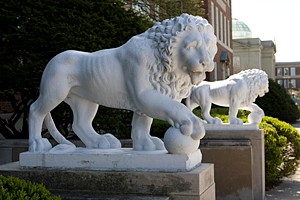
UC Awarded $1.4 Million Grant to Explore the Links Between Movement and Social Interaction
The University of Cincinnatis Department of Psychology was awarded a $1.4 million grant from the National Institutes of Health to develop computerized models of how social interaction and movement influence each other. Researchers will be examining interactive social tasks such as joke-telling and martial arts moves to see how mind, reason and movement deeply influence each other. The five-year project is anticipated to have a transformative impact on numerous fields, including the study of autism, schizophrenia, human movement and human interactions with robotics.
The cognitive system and the motor system continually influence each other, explains principal investigator Michael Richardson, a UC associate professor of psychology. Its not like a linear relationship. Its more complicated than that, but when theres some kind of diminished social functioning in people, theres a breakdown in the physical and behavioral coordination with others. So, what were seeing is a link between cognition and action.
The exercises will be conducted in the UC Psychology Departments
Perceptual Motor Dynamics Laboratory,
which includes a virtual reality simulator and motion-capture equipment. Experiments will also include interactions with model-driven avatars to explore whether interactions with those models are the same as interactions with humans.
Research on competitive sports tasks will be conducted at the College of the Holy Cross in Worcester, Mass., under the supervision of co-principal investigator Richard Schmidt.
The study will develop computerized models of four distinct tasks that require physical coordination and social interaction:
Rhythmic targeting tasks
These tasks examine how people carry on social interactions working together toward a common goal without bumping into each other. Examples include walking together, rocking chair synchronization, dancing or loading a dishwasher.
Social object-moving tasks
These tasks involve multiple participants moving an object from one location to another. Using a virtual tabletop and multiple- touch screen, as many as four participants will be studied in regard to movement and obstacle avoidance, doing virtual tasks such as clearing a table and moving objects around a room.
Structured conversation task
This experiment involves an examination of how the entire body is synchronized and coordinated during everyday conversation. Tasks will include telling jokes and guessing pictures. Part of this experiment also will involve the use of sound-occluding headphones, forcing participants to rely purely on visual information during a conversation.
Competitive sports task
This experiment will examine interpersonal reactions and synchronized play, as participants take part in a martial arts exercise. The exercise will examine attacker and defender limb movements, as researchers explore how an opponent takes the advantage and holds control in the contest.
The idea is that if we can develop a good understanding and model these kinds of behaviors, then we can design interventions even as simple as designing clinician-client situations or designing games or tasks that promote coordination with the hope that this may actually increase social connections for people with diminished social functioning such as autism, says Richardson.
Richardson says the study will involve approximately 100 participants per year and will include international consultants ranging from cognitive scientists to physicists and mathematicians. All researchers on the project will participate in workshops to be hosted by the UC Psychology Department during the third, fourth and fifth year of the research project.
Other researchers on the project include Schmidt, psychology professor at the College of the Holy Cross; Rachel Kallen, a UC assistant professor of psychology; Elliott Saltzman, a professor in the Department of Physical Therapy at Boston University and a senior scientist at Haskins Laboratories in New Haven, Conn.; and Steven Harrison, research associate, University of Nebraska Omaha.
The UC Department of Psychology is recognized nationally for the quality of its undergraduate major and the excellence of its graduate training programs in clinical and experimental psychology.
Related Stories
Volcanic ash buried huge herd of Nebraskan rhinos
April 14, 2025
Discovery magazine highlights UC research examining how prehistoric rhinos lived in mega-herds 12 million years ago.
UC celebrates community champions with prestigious...
April 14, 2025
UC honors Over-the-Rhine Community Housing and faculty with the Roger Grein and Jack Twyman Awards, celebrating impactful service-learning and community engagement.
Some fruit flies avoid parasites at expense of sleep
April 14, 2025
Some fruit flies avoid parasites at expense of sleep. But researchers found that this wakefulness makes flies more prone to starvation.
